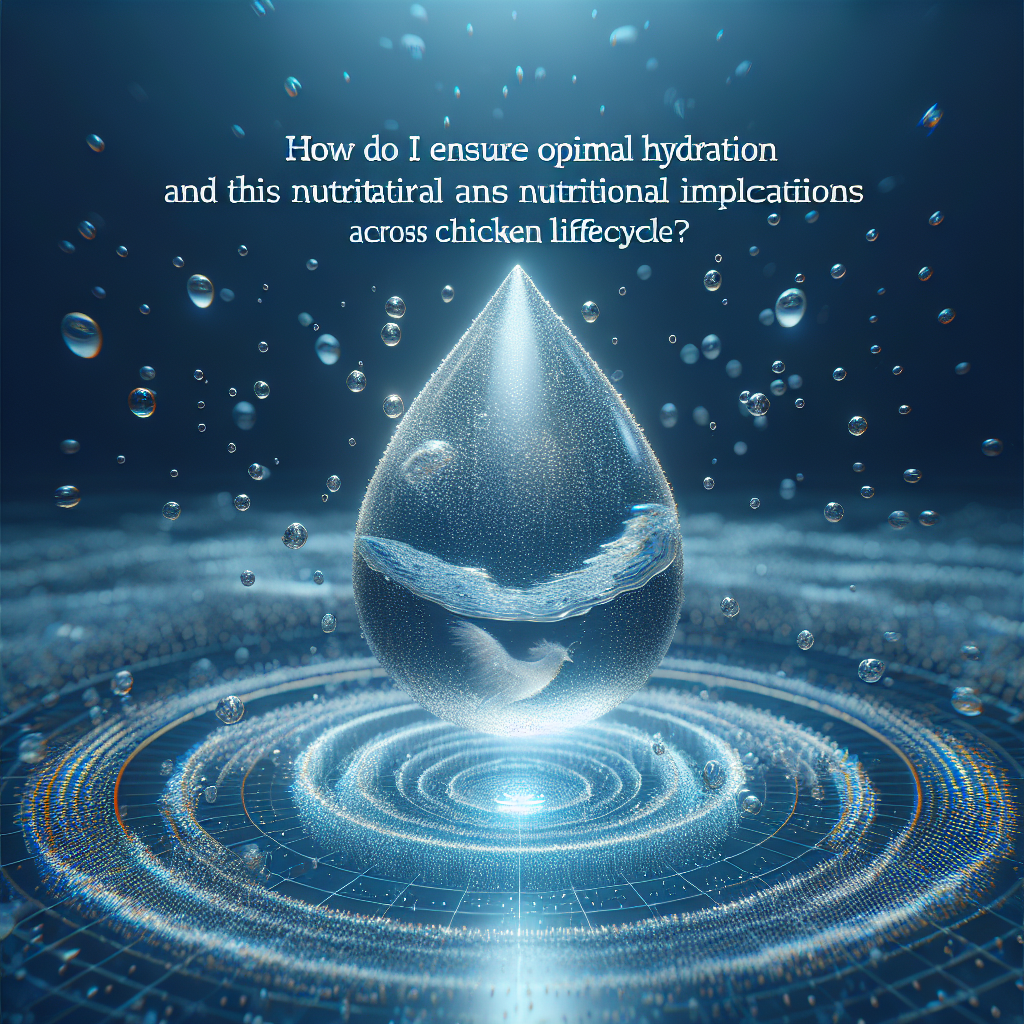Are your chickens getting the right amount of supplements in their diets? It’s important to ensure that our feathered friends are getting the right balance of nutrients, but how do we know if they’re being over or under-supplemented? In this article, we’ll explore the signs to look out for in order to ensure our chickens are receiving the optimal level of supplementation for their health and well-being. From changes in behavior to physical symptoms, we’ll help you become a pro at identifying any imbalances in your chickens’ diets. So let’s get started and make sure our chickens are happy and healthy!
Signs of Over-Supplementation in Chickens’ Diets
Over-supplementation in chickens’ diets can lead to a variety of issues that can negatively impact their health and well-being. It is important to closely monitor their nutrition to ensure they are receiving the proper balance of nutrients. Here are some signs to watch out for:
Weight Gain or Obesity
One of the most obvious signs of over-supplementation is weight gain or obesity in chickens. If they are consuming an excessive amount of certain nutrients, such as fats or carbohydrates, they may start to put on too much weight. This can lead to various health problems, like joint issues, respiratory difficulties, and heart strain.
Decreased Egg Production
Another sign of over-supplementation is a decrease in egg production. While chickens need a balanced diet to produce eggs, over-supplementing certain nutrients can disrupt their reproductive cycles. This can result in a decrease in the number of eggs laid by the chickens or even a complete halt in egg production.
Abnormal Egg Formation
Over-supplementation can also lead to abnormal egg formation. Chickens require a specific balance of vitamins and minerals to produce eggs with strong shells and healthy yolks. If their diet is excessively supplemented with certain nutrients, it can disrupt the egg formation process. Eggs may have thin shells, misshapen yolks, or other abnormalities that make them unfit for consumption.
Digestive Issues
An excessive intake of certain supplements can also cause digestive issues in chickens. Some nutrients, like certain vitamins or minerals, can irritate the digestive system when consumed in excess. This can lead to diarrhea, bloating, or other gastrointestinal problems. It is important to carefully monitor the supplementation levels to prevent these issues from arising.
Vitamin Toxicity
Over-supplementation can also result in vitamin toxicity in chickens. Certain vitamins, such as vitamin D or vitamin A, can be harmful when consumed in excessive amounts. This can cause a range of health problems, including bone disorders, organ damage, or even death. It is crucial to ensure that chickens are not receiving toxic levels of vitamins through their diet.
Calcium Deposits
Excessive calcium supplementation can lead to the formation of calcium deposits in chickens. While calcium is essential for eggshell formation, an imbalance in its intake can result in the deposition of calcium in various tissues, such as the kidneys or joints. This can lead to organ damage, reduced mobility, and overall health issues for the chickens.
Abnormal Behavior
Chickens that are over-supplemented may also exhibit abnormal behavior. Excessive intake of certain nutrients can cause behavioral changes, like restlessness, increased aggression, or hyperactivity. These changes in behavior can indicate an imbalance in their diet and may require adjustments to prevent any further complications.
Reduced Feed Intake
Over-supplementation can sometimes lead to a reduced feed intake in chickens. If their diet is imbalanced or contains excessive amounts of certain nutrients, it can affect their appetite. Chickens may become selective eaters or simply refuse to eat their feed altogether. This can further contribute to weight loss, nutrient deficiencies, and overall decline in their health.
Lack of Appetite
Similar to reduced feed intake, over-supplementation can result in a complete lack of appetite in chickens. When their diet is unbalanced or contains excessive amounts of certain nutrients, it can cause chickens to lose interest in eating. This can lead to inadequate nutrient intake and severe malnutrition if not addressed promptly.
Increased Mortality
In severe cases of over-supplementation, chickens may experience increased mortality rates. Excessive intake of certain nutrients can put a significant strain on their organs and overall health. This can weaken their immune system and make them more susceptible to diseases. If left unchecked, over-supplementation can lead to a higher mortality rate among the chicken population.
Signs of Under-Supplementation in Chickens’ Diets
Under-supplementation in chickens’ diets can also have detrimental effects on their health and productivity. Insufficient intake of essential nutrients can lead to various deficiencies, impair growth, and make them more susceptible to diseases. Here are some signs to watch for:
Slow or Stunted Growth
One of the most noticeable signs of under-supplementation is slow or stunted growth in chickens. If they are not receiving adequate amounts of essential nutrients, their growth rate may be significantly impaired. Chickens may appear smaller in size compared to others of the same breed and age.
Thin or Brittle Feathers
A lack of proper supplementation can also cause chickens to have thin or brittle feathers. Feathers require a balanced intake of certain nutrients, particularly proteins and fatty acids, to grow strong and healthy. Without sufficient supplementation, feathers may be dull, fragile, and prone to breakage. This can leave chickens vulnerable to environmental factors and affect their overall well-being.
Delayed Sexual Maturity
Under-supplementation can delay the onset of sexual maturity in chickens. Proper nutrition is essential for the development of reproductive organs and hormonal balance. If chickens are not receiving adequate nutrients, it can delay their ability to reproduce, affecting breeding programs and overall flock productivity.
Low Egg Production
Insufficient supplementation can lead to a decrease in egg production in chickens. Without an appropriate balance of nutrients, hens may have difficulty in laying eggs or produce fewer eggs overall. This can hinder commercial egg production and impact the availability of eggs for consumption.
Weak Egg Shells
Under-supplementation, particularly with regards to calcium, can result in weak egg shells. Calcium is crucial for the development of strong eggshells, and a deficiency can lead to shells that are thin, fragile, or easily cracked. This can increase the risk of bacterial contamination, reduce hatchability, and make eggs unfit for sale or consumption.
Poor Quality Eggs
Inadequate supplementation can also result in poor-quality eggs. Eggs may have abnormal yolks, irregular shapes, or abnormal coloration. The nutritional content of these eggs may also be compromised, leading to lower nutrient availability for consumers. It is essential to provide the necessary nutrients to ensure the production of high-quality eggs.
Muscle Weakness
A lack of proper supplementation can also lead to muscle weakness in chickens. Essential nutrients, such as proteins and amino acids, are required for muscle development and strength. Without sufficient intake, chickens may experience weakness, reduced mobility, and difficulties in performing normal activities.
Abnormal Bone Development
Insufficient supplementation can impact the development of bones in chickens. Adequate levels of minerals, such as calcium and phosphorus, are necessary for proper bone formation and maintenance. Without these nutrients, chickens may develop abnormal bone structures, including deformities or weakened bones. This can increase the risk of fractures and other skeletal issues.
Reproductive Issues
Under-supplementation can also result in various reproductive issues in chickens. Inadequate intake of essential nutrients can disrupt the reproductive system and hormonal balance, leading to infertility or reduced fertility. This can have significant implications for breeding programs and overall flock expansion.
Increased Susceptibility to Diseases
Chickens that are under-supplemented are more vulnerable to diseases and infections. Essential nutrients play a crucial role in maintaining a strong immune system, and deficiencies can weaken the chickens’ ability to fight off pathogens. This can lead to increased mortality rates and overall health problems within the flock.
In conclusion, it is crucial to maintain a balanced and properly supplemented diet for chickens to ensure their health, productivity, and overall well-being. Over-supplementation should be avoided to prevent weight gain, decreased egg production, and other complications. On the other hand, under-supplementation should be carefully monitored to prevent slow growth, poor feather quality, and increased disease susceptibility. Regular monitoring, proper supplementation, and adjustments based on the chickens’ specific needs are essential for maintaining optimal health and productivity in poultry farming.




